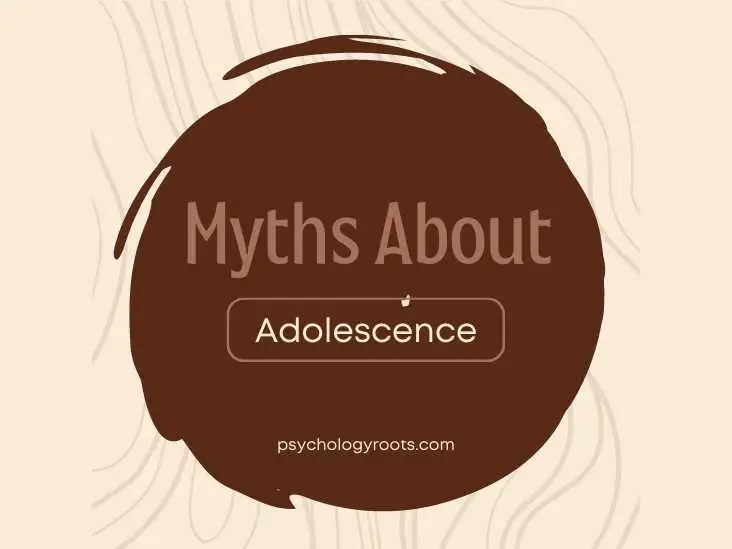Table of Contents
Myths About Adolescence
Here in this post, we are discussing and learning about “Myths About Adolescence”. You can read more about psychology-related material on our website. Keep visiting Psychology Roots.
Acquainting yourself with adolescents is the best way to get a clear picture of human growth. I find it exhilarating that the features that distinguish humans from other animals, such as consciousness, self-awareness, judgment and insight, and romance, are being developed at this time.

Myths About Adolescence
The teenage years are among the most misunderstood phases of human development. In this article, we’ll dispel five common misconceptions about teenagers.
Hormones are at their peak throughout adolescence and this causes reckless and risk-taking behavior.
Wrong. Aside from the fact that hormones play a crucial role throughout the adolescent years, they are part of a much larger biological process taking place in the brain. Adolescence is a period when the brain undergoes a major reorganization, shedding the connections it doesn’t need and establishing new ones among the neurons that do. During this time, children develop the thinking, reflecting, discovering, and self-awareness skills that are necessary for them to grow into responsible, healthy individuals.
Teenagers need freedom and don’t see grownups as very helpful
Also incorrect. Adolescents want for meaningful relationships with peers, instructors, and coaches who aren’t members of their families. However, they also want ties inside their own families, particularly with their parents, grandparents, and other close relatives. What they really want is a two-way street of dependency.
Adolescents have little regard for boundaries and are constantly pushing themselves to the edge.
False. Adolescence is a period of inquiry, curiosity, and novelty, and this isn’t about respect; it’s about the work that adolescents undertake. In adolescence, curiosity rises at an exponential rate. This is due to the fact that the brain’s reward systems are maturing. As a result of these circuits, the brain is able to create ever-increasing levels of complexity and purposefulness in the way we think, feel, act, and perceive the world. When it comes to developing one’s personality, adolescence is a crucial time for many kids.
Their emotions might be unpredictable at times.
Adolescents may seem to be emotionally intense at times, although this is more accurate. This has a clear disadvantage, but it also has an advantage. Adolescents, as we all know, maybe temperamental and let their emotions get the better of them. A positive side effect of this is that when teens have an emotional response, such as curiosity or enthusiasm, this leads to the discovery of interests, energy, motivation, creativity, and, most importantly, purpose
Adolescents live in the now.
Also incorrect. It’s in the future, in the unexplored, that they’re most at home and most interested in spending time. Graduation, college, future plans, and potential companions occupy a significant portion of their thoughts. They place a great deal of importance on the future. As a result of the epidemic, numerous rites of passage—proms, homecomings, and graduation ceremonies—have been postponed, rescheduled, or canceled for this age group.
Adolescent Brain Changes
Adolescents live in a constant state of ecstasy. During adolescence, the brain undergoes a series of transformations that develop unique ways of thinking, behaving, reasoning, relating, concentrating, and making choices.
The maturation and growth of important parts of the brain throughout this period, as well as the brain’s malleability, are the two fundamental factors that drive this shift in the brain’s structure. Adolescents’ brain development is heavily influenced by their life experiences, whether they are in school, community, on a team, in a play, or working.
As a result, teenage brain development and health will be affected in various ways if experiences are exceptionally constrained, as during the epidemic, with lockdowns, quarantining, and distant teaching; and if they are filled with blame and guilt instead of affirmation.
The paradox of the Pandemic
As a result of the pandemic’s paradox, we’ve had to distance ourselves from many of the individuals who matter most to us. A large number of teens have had some of the connections that help them cope with stress and development disrupted during this time period.
As a result, it is now more critical than ever that the environments in which young people learn and develop provide multiple possibilities for solid and trusted connections. They will be able to rediscover their feeling of purpose and self-worth as a result of these kinds of connections. True or false, it’s not a myth; it’s the reality.
Help Us Improve This Article
Have you discovered an inaccuracy? We put out great effort to give accurate and scientifically trustworthy information to our readers. Please notify us if you discover any typographical or grammatical errors.
Make a comment. We acknowledge and appreciate your efforts.
If you have any scale or any material related to psychology kindly share it with us at psychologyroots@gmail.com. We help others on behalf of you.